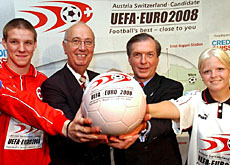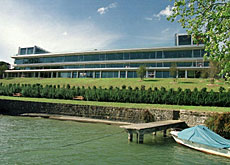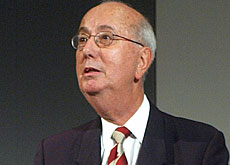Crunch time for Euro bidders

Switzerland and Austria will discover on Thursday if their joint bid to host the 2008 European football championships has been successful.
A record seven bids have been put forward to stage the prestigious and potentially lucrative event.
The fierce interest in staging the tournament is unsurprising. Generally regarded as the world’s third biggest sports event, after the football World Cup and the Summer Olympics, the European championships have also yielded healthy profits in recent years.
The 2000 event in Holland and Belgium earned the hosts around €18 million (SFr26.5 million), with the 1996 version in England yielding around €30 million.
The additional boost from related investments and the expected surge in tourism is likely to bring a mini economic boom to the successful bid team.
Complicated vote
The winner will be announced following a secret ballot in the Swiss town of Nyon, home of European football’s governing body, Uefa. The vote will involve members of Uefa’s 14-strong executive committee.
The vote has been somewhat complicated by a decision to bar committee members from voting if their own country of origin is still in the running to stage the championships.
To get around this, Uefa plans to produce a shortlist of two or three bids following the first vote, allowing members from eliminated countries to then join in subsequent voting rounds (see related story above).
The Austrian-Swiss bid has been described by many observers as the favourite, but rival campaigns from Russia, from Scotland and Ireland and from the four-nation Nordic consortium (Denmark, Norway, Finland, Sweden) are also seen as having strong chances.
Giangiorgio Spiess, a Swiss member of the Uefa Executive Committee, said the Austrian-Swiss bid stood a good chance.
“They have prepared their bid very well; the two countries have worked together successfully, and there is a lot of popular support for their bid which could help to clinch it for them.”
Although politically attractive, the Greek-Turkish and Bosnian-Croatian joint bids are thought to be outsiders because of their weaker infrastructure and because Greece is already set to stage the 2004 Summer Olympics.
Hungary’s solo bid is also seen as having little chance.
Not over-confident
“We have no reason to be over-confident, though,” warns Austrian-Swiss bid project manager Thomas Helbling. “I wouldn’t even say that we are the favourites, just that we are one of the strongest candidates.
“That has a lot to do with our technical dossier and with the official Uefa inspection of our two countries which went very well.
“But the vote won’t just be about technical matters. Uefa must decide which bid will best help to develop football in Europe and to safeguard the organisation’s image, so we have to remain realistic about our chances.”
Helbling certainly needs no reminding that favourites don’t always end up winners. Three years ago he was involved in the unsuccessful campaign to bring the 2006 Winter Olympics to the Swiss resort of Sion.
Despite being seen as the top contender, the Swiss bid was comfortably seen off by Turin in the final run-off vote.
But despite such setbacks, and the resulting emphasis on realism, the Austrian-Swiss bid team clearly believe that their chances are as good as anyone’s.
Nine good reasons
Swiss football association president Ralph Zloczower recently went as far as listing nine good reasons for choosing the Austrian-Swiss bid (see related story above): among them the central location, the existence of brand new stadiums, popular support and proven infrastructure.
“Of course, we’re full of confidence,” Zloczower told swissinfo with a little less reticence than his project manager.
“We know that we’ve done a good job over the last year and a half, but of course everything is still wide open.
“We have modern stadiums, a perfect infrastructure, the support of the fans and the government, and together with Austria we are strong enough to host these championships.”
Success on the pitch
A recent upturn in Swiss fortunes on the football pitch itself could also help the bid’s chances.
After years on the international sidelines, Switzerland has recently celebrated notable successes at junior, senior and club level.
Earlier this year, the country’s under-17 side won their version of the European championship to earn the Swiss their first ever title at international level.
Just days later the under-21s made it to the European semi-finals after qualifying for the tournament (and staging it) for the first time in history.
More recently, the country’s football fever has been re-ignited by the exploits of both the national team, who recorded an unexpected away victory in a World Cup qualifying match against their Euro 2008 bid rivals Ireland, and FC Basel who this season became the first Swiss club to reach the second round of the European Champions League.
Does size matter?
Although Switzerland and Austria can point to the existence – or imminent existence – of eight modern stadiums, the actual size of those stadiums has been picked upon by some rivals as a potential weakness in the Austrian-Swiss bid.
The Scottish and Irish team in particular have focused on this, with marketing director John Henderson claiming that “Switzerland has very small stadiums and you could fit two Swiss stadiums into [Edinburgh’s] Murrayfield stadium.”
Helbling, however, is not convinced that size will be so important to Uefa’s executive committee members.
“I’m not sure that such gigantism is really the best thing for football,” Helbling countered.
“Our stadium capacities are just as big as the Belgian and Dutch tournament in 2000, with the same total availability of 1.2 million tickets; just as importantly, I’m sure we’ll fill our stadiums for every game.
“We are right in the middle of Europe and the successful under-21 tournament here showed our ability to attract fans from across the continent and from the passionate immigrant communities living in Switzerland.
“Surely it’s better to have full stadiums than to have larger stadiums on the periphery of Europe that are probably not going to be full?”
swissinfo, Mark Ledsom
Seven bid teams from 14 countries are competing to host the tournament.
Switzerland and Austria are earmarking SFr170 million for the organisational costs, but any final deficit would be covered by Uefa.
Matches would be staged in Bern, Zurich, Geneva, Basel, Vienna, Klagenfurt, Salzburg and Innsbruck.

In compliance with the JTI standards
More: SWI swissinfo.ch certified by the Journalism Trust Initiative


You can find an overview of ongoing debates with our journalists here. Please join us!
If you want to start a conversation about a topic raised in this article or want to report factual errors, email us at english@swissinfo.ch.